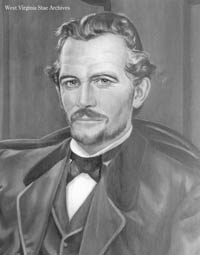

Chapter One |
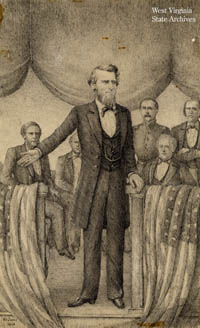 Gov. Arthur I. Boreman at his inauguration. |
On June 20, 1863, Arthur I. Boreman was inaugurated in Wheeling as West Virginia's first governor. A platform was erected in front of Linsly Institute, the temporary capitol. Following a prayer by the Reverend J. T. McLure, Gov. Peirpoint of the Restored Government of Virginia spoke. He was followed by Boreman, who gave his inaugural address. Calls for Waitman T. Willey to come forward elicited a speech from the senator. Three cheers for the State of West Virginia and three more for the United States followed.
The occasion was also marked by the singing of the patriotic song "E Pluribus Unum" by 35 young girls and the playing of the "Star Spangled Banner" by the military band. The program called for the firing of 35 guns, and fireworks were set off in the evening. |
"Saturday was a great gala day in the city. There were thousands of people here from abroad and the city turned out its entire population. . . . Flags, of all sizes, were as thick in the city almost as the locusts in the suburbs. The display of bunting was most attractive and reflected much patriotism of the people. . . . The Institute was already filled with people; the street outside was packed with men, women and children, and the windows, roofs and yards of the surrounding houses were filled with eager faces." - Wheeling Intelligencer, June 22, 1863 |
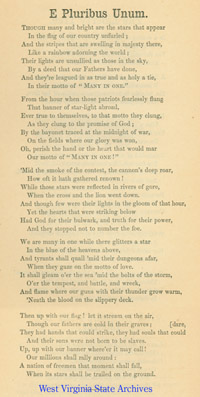 Words to "E Pluribus Unum," |
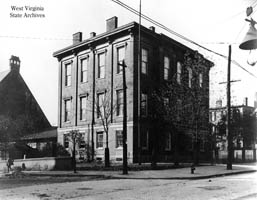 Linsly Institute |
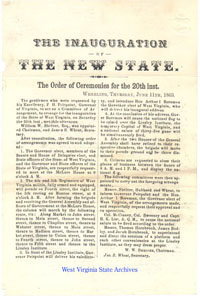 Order of Ceremonies |
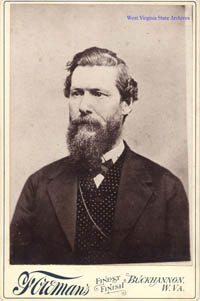 Daniel D. T. Farnsworth |
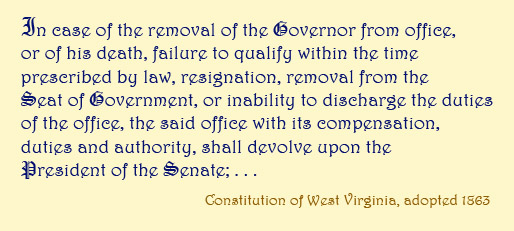 Elected again in 1864 and 1866, Boreman had no second or third inaugural ceremonies. When Boreman decided to resign as governor early in order to take his seat in the U.S. Senate, Daniel D. T. Farnsworth, President of the Senate, took the oath of office as governor on February 26, 1869, in the Executive Chamber. He would serve as governor for seven days, filling the term between Boreman's resignation and the swearing in of the newly elected governor, William Erskine Stevenson. |
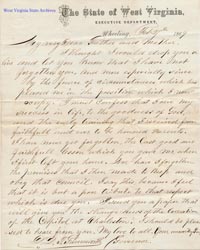 Letter from Gov. Farnsworth to his father |
A Charleston Interlude
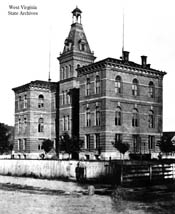
West Virginia State Capitol,
Charleston, 1870-1875
Julius Jones Collection
| The capital of West Virginia moved to Charleston in 1870, where it remained for the next five years. John J. Jacob would be the only governor inaugurated during those years in Charleston. Jacob's inauguration took place on the front steps of the new capitol building on March 4, 1871, with about 300 people present. After his inaugural address and the swearing in of the various new state officials, champagne and cake was served in the Senate Chamber. The occasion was marred by a fight between two men, "resulting in cut heads and a display of knives and revolvers." | 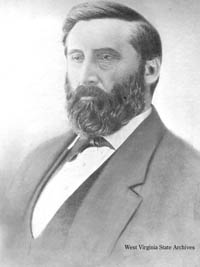 John J. Jacob |
Back to Wheeling
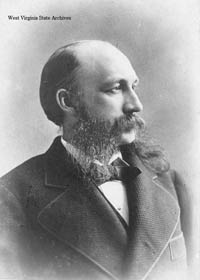 Henry M. Mathews |
With the capital back in Wheeling in 1875, the inauguration of Henry M. Mathews took place on March 5, 1877, the 4th having fallen on a Sunday. Mathews's inauguration was a more elaborate affair than previous inaugurals had been, beginning a trend that subsequent governors continued. Activities began with a procession of officials from the governor's reception room down the halls of the second Wheeling capitol to the west front where the swearing-in ceremony took place. The Reverend Dr. D. A. Cunningham gave the prayer, and then Gov. Jacob introduced his successor Governor-elect Mathews. Following his inaugural address, Mathews took the oath of office. That evening, a public reception was held in the Senate, followed by a ball in the House of Delegates and supper in the Supreme Court. | 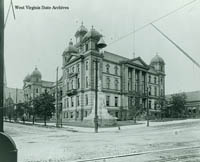 West Virginia State Capitol, Wheeling, 1875-1885 |
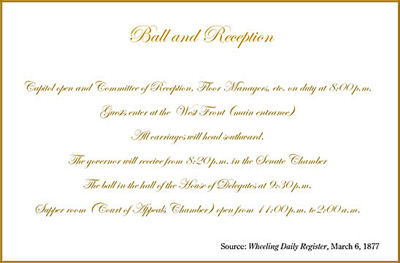
Information on schedule for ball and reception
from Wheeling Daily News
|
"About 11 o'clock the streets showed signs of a gathering crowd, Market street especially being lined here and there by knots of people taking up a line of observation on the curbstone. . . . Kramer's band proceeded to the Court House, where the Young Men's Democratic Club was forming, and escorted that organization to the McLure House. At this point a number of hacks and carriages was in waiting. Governor Jackson, ex-Governor Mathews, Private Secretary Will. Jackson and Chief Justice Moore occupied the first carriage, and members of the House of Delegates, Senators, State officers and the lady friends of the incoming administration occupied other hacks and carriages. When all was in readiness, the Young Men's Democratic Club, fifty members, Captain John M. Birch in command, and headed by Kramer's superb band, marched by and took their place at the head of the procession, and at the word of command given by Chief-Marshal J. C. Alderson, the column moved down Market Street to Sixteenth and thence up to the Capitol." - Wheeling Intelligencer, March 5, 1881 |
Four years later, on March 4, 1881, "a regular March day, blustering, windy and snowy," Mathews was succeeded by Jacob B. Jackson. Following a procession from the McLure House to the capitol, the inauguration took place on the west portico. Governor Mathews introduced Jackson, who gave his inaugural address and took the oath of office. That evening a ball was held in the capitol, which was "brilliantly illuminated and presented a beautiful exterior appearance." Flags and bunting decorated the House of Delegates and Senate chambers, where the ball and reception were held. Supper was served in the Supreme Court, as it had been four years earlier. Kramer's band again provided music for the affair.
Between the arrival of the procession at the capitol and the beginning of ceremonies on the west portico, retiring Governor Henry Mathews was presented by the citizens of Wheeling with a silver tea set. On each of the six pieces the letter "M" was engraved, and on the salver was the inscription "Presented to Governor Henry M. Mathews, March 4, 1881." |
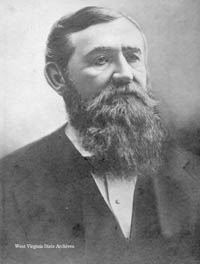 Jacob B. Jackson |
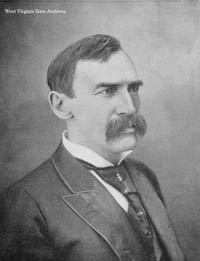 E. Willis Wilson |
On March 4, 1885, E. Willis Wilson became the last governor inaugurated in Wheeling. The procession of carriages, led by the chief marshal, a group of policemen, Kramer's band, and the Jefferson Democratic Club, arrived at the capitol shortly before noon. Wilson, the Rt. Rev. Bishop Kain, Governor Jackson, and Supreme Court Justice Okey Johnson headed a procession through the building to the east balcony. After Wilson gave his inaugural address and took the oath of office, the dignitaries retired to the governor's private office. As during the change of administrations four years earlier, the departing governor was presented with a gift, a gold-headed cane inscribed "To Governor J. B. Jackson, A Man Who Dares to do Right, from His Janitor, 1885." | 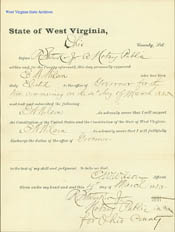 E. Willis Wilson oath |
| At 10 p.m., a formal reception was held in the executive apartment in the capitol, although the governor's wife Henrietta Wilson was ill and unable to be present. The inaugural ball followed on the second floor in the hall of the House of Delegates, accompanied by Kramer's orchestra, and supper was served in the Supreme Court at midnight. |
Kramer's Programme
1. Promenade Concert and Valse
|
Two months later, in May 1885, West Virginia's capital was moved permanently to Charleston.

